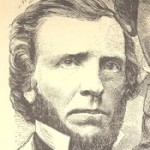 Confederate commissioners to the United States, Martin Crawford of Georgia (illustration, a Southern Baptist) and John Forsyth of Alabama propose, to U.S. Secretary of State William Seward, a peaceful solution to the hostilities between the two nations. Basically, Crawford and Forsyth maintain the rightness of the southern “revolution” that has established an independent nation, and express their hope that the two nations can co-exist peacefully despite their differences.
Confederate commissioners to the United States, Martin Crawford of Georgia (illustration, a Southern Baptist) and John Forsyth of Alabama propose, to U.S. Secretary of State William Seward, a peaceful solution to the hostilities between the two nations. Basically, Crawford and Forsyth maintain the rightness of the southern “revolution” that has established an independent nation, and express their hope that the two nations can co-exist peacefully despite their differences.
Seward rejects the offer, and the rejection is later described before the assembled Confederate Congress:
The Secretary of State frankly confesses that he understands the events which have recently occurred, and the condition of political affairs which actually exists in the part of the Union to which his attention has thus been directed, very differently from the aspect in which they are presented by Messrs Forsyth and Crawford. He sees in them, not a rightful and accomplished revolution and an independent nation, with an established government, but rather a perversion of a temporary and partisan excitement to the inconsiderate purposes of an unjustifiable and unconstitutional aggression upon the rights and the authority vested in the Federal Government, and hitherto benignly exercised, as from their very nature they always must so be exercised, for the maintenance of the Union, the preservation of liberty, and the security, peace, welfare, happiness, and aggrandizement of the American people. The Secretary of State, therefore, avows to Messrs. Forsyth and Crawford that he looks patiently, but confidently, for the cure of evils which have resulted from proceedings so unnecessary, so unwise, so unusual, and so unnatural, not to irregular negotiations, having in view new and untried relations with agencies unknown to and acting in derogation of the Constitution and laws, but to regular and considerate action of the people of those States, in cooperation with their brethren in the other States, through the Congress of the United States, and such extraordinary conventions, if there shall be need thereof, as the Federal Constitution contemplates and authorizes to be assembled.
Source of quote (link)


